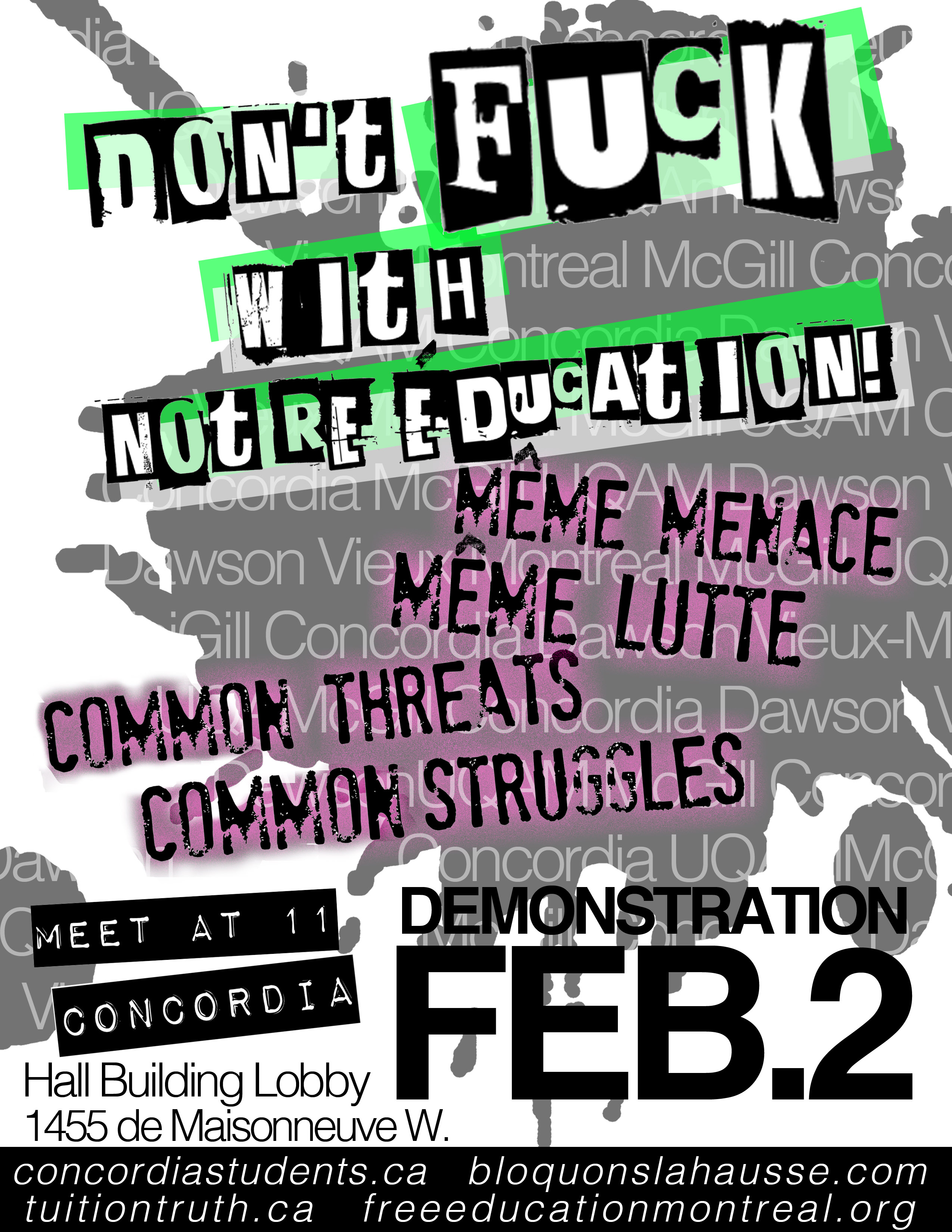All out! The Canadian Federation of Students’ (CFS) Day of Action will soon see thousands marching upon Canadian capitals. The CFS is the largest student lobby in the country, representing more than 500, 000 members and on February 1, members and students will protest against the ever-increasing tuition fees and student debt. On February 1, students will shout; on February 2, this energy, so rarely mobilized, will have died down. Or will it? As is often the case, Québec has a mind of its own. Strife with infighting, our student movement is nonetheless heading towards an unlimited general strike to protest imminent tuition hikes. Foreshadowing this winter of discontent, anglophone and francophone students will march in solidarity on February 2 under a straightforward banner: “don’t fuck with notre éducation.”
When Québec Premier Jean Charest announced that tuition fees would steeply increase, students reacted immediately, striking for a day and joining a national demonstration in Montreal. His attacks are vicious: $1,625 per year, distributed over five years, represents a 75 per cent increase compared to current levels. In spite of feeble compensatory measures, research sponsored by the Ministry of Education shows that this will have a devastating effect on accessibility, barring more than 7,000 people from attending university. Accordingly, student debt will rise to stratospheric levels. Political choices, not economic necessity, shape Québec’s education policies: the funding model of universities increasingly relies on an under-taxed private sector. Yet, Québec students have so far enjoyed the lowest tuition fees in Canada. No wonder: every promise of tuition hikes was met with general strikes spurred by the last radical student movement of the country. Its latest incarnation is the Coalition Large de l’ASSÉ (CLASSE), a temporary structure designed to strengthen the Association pour une Solidarité Syndicale Étudiante (ASSÉ) for the duration of the general strike. The CLASSE is built around principles of direct democracy, combative syndicalism and feminist analysis. It rejects lobbyism, establishing instead a power relationship with the government through direct action and sustained mobilization. Over the years, the ASSÉ has articulated a comprehensive vision of education, free from tuition fees and corporate influence.
On anglophone campuses, left-wing activism is centred around Québec Public Interest Research Groups (QPIRG) and other grassroots efforts, external to the student union. These groups are often attacked and forced to mobilize most of their resources simply to defend themselves. Student unions tend to be bureaucratic monsters (the Student Society of McGill University can count on more than 200 employees) governed by complicated, hierarchical structures. As a result of these differences, anglophone institutions, concentrated in Montreal — McGill, Concordia and a few colleges — have been historically cut off from the broader student movement. This is no longer true.
McGill University students know that for a fact. The institution has long been considered an old boy’s school, a refuge for rich anglophones sheltered from tumultuous changes happening outside of the grey limestone campus. The shifting nature of McGill activism is best explained by the boys in blue. Riot police have visited twice: in 1969, to disperse a demonstration and on November 10, 2011, as 14 occupiers stormed into the James administration building to highlight Principal Heather Munroe-Blum’s lobbying for tuition hikes. The police response — irritant gas and pepper spray hurled against “kettled” protesters — sent a shock-wave through campus. “It had a reinvigorating effect; since September, there had been a lot of student involvement in issues on campus, especially the McGill University Non-Academic Certified Association (MUNACA) strike; then activism declined a bit. “November 10 changed all that”, recalls one of the 14 occupiers. “Immediately after November 10, there was a huge upswing in involvement. One thousand people came to an event on the next Monday. November 10 demonstrates that McGill radicals can garner support from the community.”
Frank Lévesque-Nichols, a tall, chatty Université du Québec à Montréal (UQÀM) student, is a spokesperson for the February 2 demonstration: “We aim to bring awareness to students — of UQÀM, McGill and Concordia, but also of colleges like the Vieux-Montréal and Dawson College — about the evolving nature of the progressive student movement.” Dawson College, interestingly, is the only Québec member of the Canadian Federation of Students and it will take part in both the CFS Student Day of Action on February 1 and the February 2 demonstration. “The radical left can and should work hand in hand, beyond language politics. February 2 will allow students to step outside of their boundaries and realize we wield a collective power, that we are plural.”
This newfound collaboration already gave way to concrete results. On January 31, McGill Arts Undergraduate Society (AUS) members might vote to join the CLASSE, the first anglophone union to do so. Others are expected to follow suit. Set against a backdrop of austerity, students all over the province are holding strike general assemblies and hope to recreate the momentous political changes brought about by previous mass movements. On February 2, the solitudes will march in solidarity. Soon, they will strike together for public, accessible education free of corporate influence.
The February 2 demonstration will start at 11:00 a.m. from Concordia’s Hall Building 1455 De Maisonneuve in Montreal.
Get your banners and placards ready and bring along your solidarity and creativity!
For more information on the February 2 demonstration please visit the Facebook events page.
Jérémie Bédard-Wien is a distance student based in Montréal.



